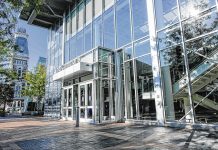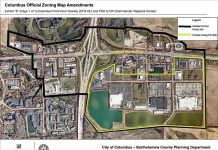Bartholomew Consolidated School Corp. is considering seeking a capital referendum to ask voters’ permission to finance a number of facilities projects — however, unlike the recent operating referendum, school officials say that this time, the tax rate would not increase.
The subject arose during a strategic planning session on March 24, as school officials discussed projected enrollment and facilities needs with school board members.
Currently, the school corporation is in the middle of remodeling Parkside Elementary, which is expected to be the first of several renovations to BCSC buildings.
“We have two problems or opportunities in the district,” said Director of Operations Brett Boezeman. “One is the fact that we do have some enrollment things to be mindful of. Also, we have buildings that need improvements and renovated.”
Most BCSC schools were built in the 1950s and ’60s, he said. The newest is Central Middle School, which was built in 2007. Out of the district’s elementary schools, Clifty Creek is the newest, built in 1983.
Superintendent Jim Roberts mentioned that the school corporation purchased land on the west side some time ago with the expectation that there might be a need for another elementary school there. He said that it may be time to revisit this possibility, given growth on the district’s west side.
In discussing funding options for BCSC’s facilities projects, Assistant Superintendent of Financial Services Chad Phillips presented the possibility of putting a capital referendum on the ballot. This type of referendum is also referred to as a “controlled project” referendum, as opposed to an operating referendum — which is what local voters approved in June of 2020.
According to the Indiana Department of Local Government Finance, a controlled project generally includes any project financed by bonds or a lease payable by property taxes. A controlled project referendum process applies to the following types of controlled projects:
- Any school building for K-12 education that will cost “more than the lesser of $18,318,651 (for a preliminary determination made in 2023) or 1% of the total gross AV (assessed value) of property within the political subdivision on the last assessment date, if that amount is at least $10,000,000.”
- Any other controlled project by a political subdivision that falls into the above price range.
- Any other controlled project that, when combined with the cost of all other controlled projects a political subdivision has decided to fund via bonds or a lease within the past year, will cost the subdivision more than $25 million.
Ballot language for a controlled project referendum must be approved by the Department of Local Government Finance before the question can be placed on a ballot. The department is also responsible for determining the tax rate increase that would occur if the controlled project is approved.
On the other hand, a school board may choose to seek an operating referendum — also known as a school tax levy referendum — if that body has determined that the corporation “1) cannot carry out its public educational duty unless it imposes a referendum tax levy or (2) that a referendum tax levy should be imposed to replace property tax revenue that the school corporation will not receive because of the application of circuit breaker credits.”
For both types of referendums, the property taxes approved by voters are not subject to property tax caps.
In the recent operating referendum, 61.33% of voters answered “yes” to a ballot question that asked if they would be willing for BCSC to impose an additional property tax rate not exceeding $0.1560 on each $100 of assessed value “for the purpose of increasing compensation for teachers and support staff and maintaining student safety.”
The school corporation also used funds from the referendum to help support turning elementary STEM labs into specials rotations with certified teachers. The referendum lasts for a total of eight years, and officials have said in the past that the community would likely vote on its renewal in 2028.
BCSC previously completed a successful capital referendum on about $89 million in renovations to Columbus East and North high schools, with 68% of voters answering “yes” to the following question in 2008: “Shall Bartholomew Consolidated School Corp. issue bonds or enter into a lease to finance additions to and renovations of Columbus North High School and Columbus East High School?”
At the time, it was estimated that the projects would raise the tax rate 7 cents per $100 of assessed value, starting in 2012.
In his presentation to the board, Phillips discussed noted that there are four contributors to BCSC’s tax rate, which is currently $0.9997 per every $100 of assessed value. The contributors are as follows:
- Operations fund — Largest portion of the rate. A maximum levy for this fund is set by the state, and the operations fund absorbs almost all of the district’s tax cap losses
- Operating referendum — Rate-capped levy based on the question that was approved by taxpayers in 2020
- Non-exempt debt service — Funds semi-annual payments on non-referendum debt. Currently, there are 10 active bond issues that fit into this category, including general obligation bonds and lease rentals.
- Exempt debt service — Funds semi-annual payments on referendum debt.
“We have one of those,” said Phillips. “The high school referendum passed in 2008 to renovate both high schools at a cost of $89 million.”
A notable difference between non-exempt and exempt debt is that the latter category captures assessed value from Tax Increment Financing (TIF) districts. Exempt debt is also outside of tax caps. However, Phillips noted that both of these features do not apply to the 2008 high school referendum due to when it was passed.
Phillips said that if the school corporation were to take no action on funding future projects, its debt service would “dramatically decline” over the next decade. This provides an opportunity for BCSC to fund needed facility improvements without increasing its total property tax rate.
“This ultimately comes down to a really important decision that the board is going to have to make in the next six months or so,” he said. “And it is the decision between exempt debt and non-exempt debt.”
Non-exempt debt would involve BCSC officials coming to the school board every one or two years with requests for general obligation or lease rental bonds. Phillips described it as taking things “one building at a time” with several bond issues over the next five or so years.
On the other hand, exempt debt would involve a single bond being issued, likely sometime in 2024.
There are multiple benefits to the latter method, said Phillips. These include having debt that is not subject to tax cap limits.
He explained that property taxes within the state of Indiana are capped at 1% of net assessed value for homesteads, 2% for rentals and farmland generally, and 3% for all other property. For school districts, the negative impact of these caps mostly seen in the operations fund. In 2022, BCSC collected $1.8 million less than it would have without tax caps. This figure is expected to keep increasing, with the 2023 losses estimated at about $2.1 million.
“If we continue down the route that we are today, we issue multiple bonds over the next several years, non-exempt bonds, all of that debt is issued within the tax cap limit,” said Phillips.
It’s estimated that this would result in tax cap losses of about $40 million to $47 million for BCSC from 2025 to 2033. On the other hand, issuing a single exempt bond will result in debt that is outside of tax cap limits, with estimated tax cap losses of between $26 to $32 million during that same period.
With multiple non-exempt bond issues, the impact will fall almost entirely on taxpayers who are not at the tax cap. On the other hand, with a single exempt issue, the same rate is applied to all taxpayers.
“So it’s the lower socioeconomic groups who would likely be more impacted by the non-exempt,” observed school board member Nicole Wheeldon.
Phillips said other advantages for a single exempt issue include the expectation of less impact from inflation, being able to save costs by using the same contractors for multiple projects, lower cost of issuance and lower tax cap losses for other taxing units.
However, in order for BCSC to issue a single exempt bond, the community would need to give its approval via a referendum.
“It’ll take the work of a lot of people if that’s the route we end up going, on exempt debt,” said Phillips. “The difference between this exempt debt and a lot of communities, it’s unusual in that we would be going to the taxpayers and saying, ‘Please continue to pay the same rate.’ … We’re saying, ‘If you approve this, you get to continue to invest in our buildings, have high quality schools, and pay the same tax rate.’”
He added that the school corporation does not yet have a cost estimate for facility projects that would potentially be funded through this method.
The next few months will be spent preparing a facility plan and estimates, which will be presented to the school board at a strategic planning session in July. From July to September, BCSC will gather community input and feedback on the facility plan, with a final version of the document being brought before the board in October. The decision on whether to pursue several non-exempt bonds or a single exempt bond would have to be made by November or December at the latest.
“The plan that we’re going to bring you is what we think is the best for kids and the community, and the cost will be what the cost is,” said Phillips. “That’s why we’ll spend the next several months after that deciding what the community supports and doesn’t support and gathering feedback from all kinds of stakeholders, both internally and externally.”





